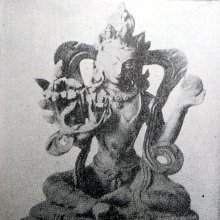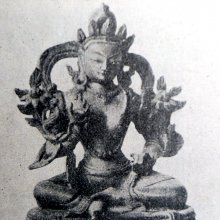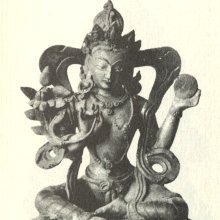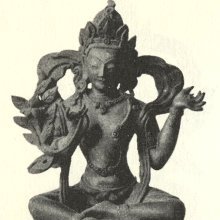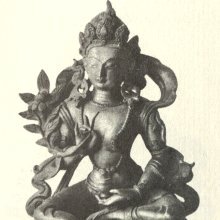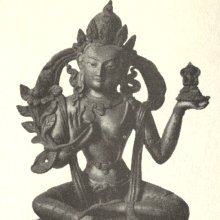Vasita, Vāsita, Vaśitā, Vaśita, Vasitā, Vashita, Vāśita, Vāśitā, Vāsitā: 25 definitions
Introduction:
Vasita means something in Buddhism, Pali, Hinduism, Sanskrit, Marathi, Hindi. If you want to know the exact meaning, history, etymology or English translation of this term then check out the descriptions on this page. Add your comment or reference to a book if you want to contribute to this summary article.
Vasita has 25 English definitions available.
The Sanskrit terms Vaśitā and Vaśita and Vāśita and Vāśitā can be transliterated into English as Vasita or Vashita, using the IAST transliteration scheme (?).
Images (photo gallery)
(+6 more images available)
Languages of India and abroad
Sanskrit dictionary
[Deutsch Wörterbuch]
Source: Cologne Digital Sanskrit Dictionaries: Böhtlingk and Roth Grosses Petersburger WörterbuchVaśitā (वशिता):—(von vaśin) adj. die übernatürliche Kraft Alles seinem Willen zu unterwerfen [Hemacandra’s Abhidhānacintāmaṇi 202.] [Bhāgavatapurāṇa 11, 15, 16.] [Vyutpatti oder Mahāvyutpatti 24] werden zehn vaśitā eines Bodhisattva aufgezählt: āyurvaśitā, citta, pariṣkāra, karma, upapatti, adhimukti, dharma, praṇidhāna, ṛddhi und jñāna .
--- OR ---
Vāśita (वाशित):—1. (von vāś) n. Geheul, Gekrächz u.s.w. [Amarakoṣa 1, 1, 6, 4.] [Hemacandra’s Abhidhānacintāmaṇi 1407.] gomāyu [Rāmāyaṇa 3, 64, 10.] śakuneḥ [Mahābhārata 9, 1797] (vāsita ed. Calc.). [Varāhamihira’s Bṛhajjātaka S. 88, 26. 29. 36.] gṛdhravāyasa [Kathāsaritsāgara 18, 147. 121, 169.] mayūravāsita Comm. zu [NYĀYAS. 2, 1, 36.]
--- OR ---
Vāśita (वाशित):—2. = vāsita (von vāsay) [SVĀMIN] zu [Amarakoṣa] nach [Śabdakalpadruma]
--- OR ---
Vāśitā (वाशिता):—
--- OR ---
Vāsita (वासित):—1. s. u. dem caus. von 3. vas .
--- OR ---
Vāsita (वासित):—2. s. u. dem caus. von 5. vas .
--- OR ---
Vāsita (वासित):—3. s. unter vāsay .
--- OR ---
Vāsita (वासित):—4. n. = jñānamātra [Hemacandra’s Anekārthasaṃgraha 3,] [?295; vgl. 2.] vāsana
1) c).
--- OR ---
Vāsita (वासित):—5. n. = vāśita [Hemacandra’s Abhidhānacintāmaṇi 1407, v. l.] [Medinīkoṣa t. 152.]
--- OR ---
Vāsitā (वासिता):—f. s. unter vāśitā .
Sanskrit, also spelled संस्कृतम् (saṃskṛtam), is an ancient language of India commonly seen as the grandmother of the Indo-European language family (even English!). Closely allied with Prakrit and Pali, Sanskrit is more exhaustive in both grammar and terms and has the most extensive collection of literature in the world, greatly surpassing its sister-languages Greek and Latin.
See also (Relevant definitions)
Partial matches: Vasi, Vaci, Ta.
Starts with: Vashitagrishti, Vashitaprapta, Vasitabba, Vasitaka, Vasitar, Vasitavasana, Vasitavya.
Ends with (+71): Adhimuktivashita, Adhivasita, Adhyavasita, Anadhyavasita, Anavasita, Aniravasita, Anuvasita, Anvavasita, Aparyavasita, Ashrvasita, Ashvasita, Avasita, Avyavasita, Ayurvashita, Buddhabodhiprabhavashita, Caturvyavasita, Cetovashita, Chaturvyavasita, Chittavashita, Cittavashita.
Full-text (+74): Karmavashita, Adhivasita, Vasitar, Udavasita, Pravasita, Vivasita, Parivasita, Pranidhanavashita, Cittavashita, Parishkaravashita, Jnanavashita, Liptavasita, Upapattivashita, Adhimuktivashita, Riddhivashita, Dharmavashita, Ayurvashita, Ten Masteries, Vasay, Anuvasita.
Relevant text
Search found 27 books and stories containing Vasita, Vāsita, Vaśitā, Vaśita, Vasitā, Vashita, Vāśita, Vāśitā, Vāsitā, Vashi-ta, Vaśi-tā, Vasi-ta; (plurals include: Vasitas, Vāsitas, Vaśitās, Vaśitas, Vasitās, Vashitas, Vāśitas, Vāśitās, Vāsitās, tas, tās). You can also click to the full overview containing English textual excerpts. Below are direct links for the most relevant articles:
The Indian Buddhist Iconography (by Benoytosh Bhattachacharyya)
Figure 221 - Twelve Vaśitā Goddesses: Upapattivaiśtā
Brihad Bhagavatamrita (commentary) (by Śrī Śrīmad Bhaktivedānta Nārāyana Gosvāmī Mahārāja)
Verse 2.1.2 < [Chapter 1 - Vairāgya (renunciation)]
Maha Prajnaparamita Sastra (by Gelongma Karma Migme Chödrön)
6. Prāntakoṭika dhyāna < [Part 4 - Questions relating to the dhyānas]
Bodhisattva quality 29: a hundred thousand samādhis < [Chapter XIII - The Buddha-fields]
Act 10.4: The lotuses thrown by Śākyamuni filled the Buddha universes of the east < [Chapter XV - The Arrival of the Bodhisattvas of the Ten Directions]
Bhakti-rasamrta-sindhu (by Śrīla Rūpa Gosvāmī)
Verse 3.2.44 < [Part 2 - Affection and Service (dāsya-rasa)]
Sahitya-kaumudi by Baladeva Vidyabhushana (by Gaurapada Dāsa)
The Great Chronicle of Buddhas (by Ven. Mingun Sayadaw)
Eight Mundane Features of the Buddha’s Willpower < [Chapter 42 - The Dhamma Ratanā]
